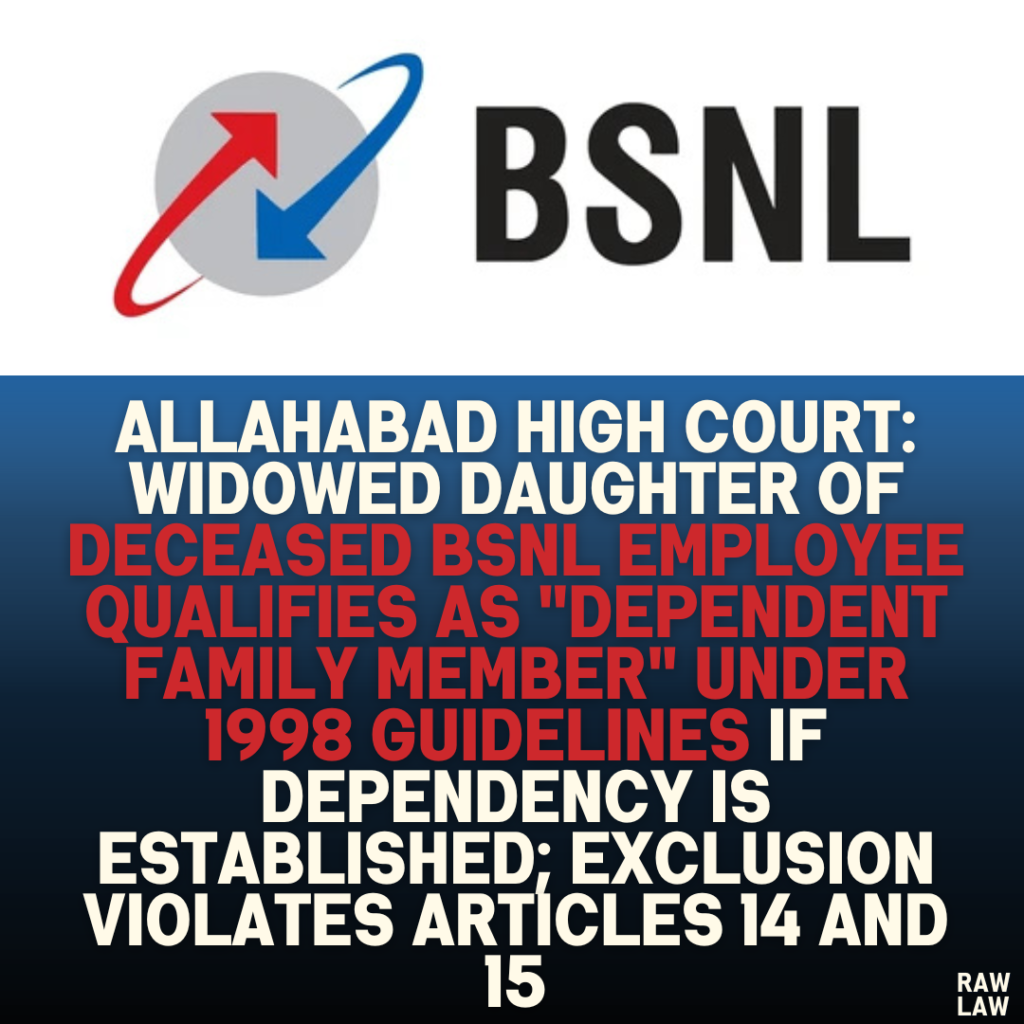Court’s Decision:
The Allahabad High Court quashed the Central Administrative Tribunal’s (CAT) order rejecting the petitioner’s plea for compassionate appointment. The Court held that a widowed daughter qualifies as a “dependent family member” under the 1998 Guidelines for Compassionate Appointment if she can establish dependency on her deceased parent. It directed Bharat Sanchar Nigam Limited (BSNL) to reconsider the petitioner’s application without discriminating based on her marital or widowed status.
Facts of the Case:
- The Petitioner’s Background:
- The petitioner, a widowed daughter of a BSNL employee who passed away while in service in 2011, was financially dependent on her father after her husband’s death.
- She applied for compassionate appointment in 2016, presenting affidavits from her mother, brother, and married sisters, affirming her sole eligibility and dependency.
- BSNL’s Rejection:
- The petitioner’s application was rejected based on the 1998 Guidelines, which purportedly do not include widowed daughters as eligible “dependent family members.”
- CAT Decision:
- The CAT upheld BSNL’s rejection, emphasizing that policy decisions regarding eligibility for compassionate appointments lie solely within the executive’s domain.
- The Petitioner’s Appeal:
- The petitioner approached the Allahabad High Court, seeking relief and arguing that her exclusion from consideration was unconstitutional.
Issues Addressed:
- Eligibility of Widowed Daughters:
- Does a widowed daughter qualify as a “dependent family member” under the 1998 Guidelines for Compassionate Appointment?
- Constitutional Validity of Exclusion:
- Is the exclusion of widowed daughters from eligibility discriminatory under Articles 14, 15, and 16 of the Constitution of India?
Petitioner’s Arguments:
- The petitioner argued that she remained her father’s dependent even after her husband’s death and continued to belong to her father’s family for all practical purposes.
- Relying on judicial precedents, she contended that excluding widowed or married daughters from compassionate appointment schemes violated constitutional provisions against discrimination.
Respondent’s Arguments:
- BSNL argued that the exclusion of widowed daughters from eligibility was consistent with the 1998 Guidelines.
- It claimed that courts, including the CAT, cannot intervene in or modify executive policies governing compassionate appointments.
Analysis of the Law:
- Examination of the 1998 Guidelines:
- The Guidelines define “dependent family members” to include daughters but do not explicitly exclude widowed daughters.
- Subsequent procedural documents, such as the 2007 BSNL memorandum, referred to “unmarried daughters,” but the Court emphasized that procedural memos cannot override the substantive guidelines.
- Purpose of Compassionate Appointments:
- The scheme aims to provide relief to families of deceased employees facing financial destitution. Excluding widowed daughters who lack financial means is contrary to this objective.
- Interpretation of Dependency:
- Dependency, not marital status, should be the determining factor for eligibility. A widowed daughter, in the absence of independent means of livelihood, satisfies this criterion.
Precedent Analysis:
- Vimla Srivastava v. State of U.P.:
- Struck down the exclusion of married daughters from compassionate appointment schemes under Uttar Pradesh rules as unconstitutional.
- Meenakshi Dubey v. M.P. Poorv Chhetra Vidut Vitran Co. Ltd.:
- Held that depriving married daughters of eligibility violated Articles 14, 15, and 16 of the Constitution.
- Calcutta High Court in Purnima Das Case:
- Emphasized that marital status should not exclude daughters from compassionate appointment schemes if dependency is established.
- Other Rulings:
- Courts in Karnataka, Madras, Rajasthan, and Tripura have consistently expanded the definition of “dependent family members” to include married and widowed daughters.
Court’s Reasoning:
- Broad Interpretation of “Family”:
- The term “daughter” in the 1998 Guidelines is inclusive and not limited by marital status. The absence of the term “unmarried” supports a broader interpretation.
- Equality and Non-Discrimination:
- Excluding widowed daughters while considering married sons for compassionate appointments violates Articles 14 and 15, which guarantee equality and prohibit gender-based discrimination.
- Dependency-Based Approach:
- A widowed daughter, lacking financial means, is presumed dependent on her deceased parent unless proven otherwise.
- Purpose-Driven Reading:
- The objective of compassionate appointments is to alleviate financial crises faced by the deceased employee’s family. Excluding widowed daughters undermines this purpose.
Conclusion:
- The Court held that widowed daughters are included in the definition of “daughter” under the 1998 Guidelines if they can demonstrate dependency on the deceased employee.
- It quashed the CAT’s decision and directed BSNL to reconsider the petitioner’s application within two months without relying on her marital status as a ground for rejection.
Implications:
- Wider Scope for Compassionate Appointments:
- The ruling reinforces the principle that dependency, not marital status, determines eligibility under compassionate appointment schemes.
- Constitutional Compliance:
- Entities like BSNL must ensure their policies align with constitutional mandates against gender-based discrimination.
- Judicial Interpretation of Policies:
- The decision underscores the judiciary’s role in ensuring that executive policies serve their intended purpose and comply with constitutional principles.
